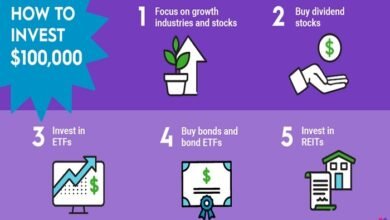How to Invest Money: A Beginner’s Guide to Building Wealth

Introduction
Learning how to invest money is a crucial step toward financial security and wealth creation. Whether you’re looking to save for retirement, buy a home, or grow your savings, understanding the basics of investing is essential. Investments allow you to put your money to work, generate passive income, and secure your future. In this guide, we’ll break down how to invest money effectively and set yourself up for long-term success.
Your Financial Goals Before You Invest Money
Before you start to invest money, it’s important to define your financial goals. Are you saving for short-term needs like an emergency fund, or long-term goals like retirement? Knowing your objectives will help you decide how much money to invest and where to allocate it.
Short-term goals usually require safer investment options like high-yield savings accounts or certificates of deposit. Long-term goals, however, provide opportunities for higher returns through options like stocks, real estate, or mutual funds. Having a clear roadmap is the first step in learning how to invest money effectively.
Build an Emergency Fund Before You Start to Invest Money
One of the golden rules of learning how to invest money is to first establish an emergency fund. An emergency fund acts as a financial safety net, covering unexpected expenses like medical bills, car repairs, or job loss. Without this buffer, you may be forced to withdraw from your investments prematurely, potentially incurring losses.
Experts recommend saving three to six months’ worth of expenses in a liquid and accessible account. Once you have a sufficient emergency fund, you can confidently start to invest money for your long-term goals.
Learn About Different Investment Options to Invest Money Wisely
Understanding where to invest money is key to building a diversified portfolio. Here are the most common types of investments to consider:
- Stocks: When you invest money in stocks, you’re buying shares of a company. Stocks offer high growth potential but come with higher risks.
- Bonds: Bonds are debt securities that offer fixed returns over a period of time, making them a safer choice for conservative investors.
- Mutual Funds: Mutual funds pool money from multiple investors to purchase a diversified set of assets. They are managed by professionals, making them ideal for beginners.
- Real Estate: Investing money in real estate can provide steady income through rent and capital appreciation over time.
- Index Funds & ETFs: These options track the performance of a specific market index, offering a low-cost way to invest money in a diversified manner.
Exploring these options will give you a better understanding of how to invest money across various assets.
Assess Your Risk Tolerance Before You Invest Money
Before deciding how to invest money, it’s important to evaluate your risk tolerance. Your risk tolerance refers to how much risk you’re willing to take in exchange for potential returns. This depends on factors like your age, financial goals, and comfort level with market volatility.
Young investors generally have a higher risk tolerance because they have more time to recover from market downturns. As you grow older, you may want to shift toward safer investments like bonds or dividend stocks. Understanding your risk appetite will help you decide where and how to invest money for the best possible outcomes.
Start Small and Use Investment Platforms to Invest Money
Thanks to technology, it’s easier than ever to invest money through online platforms and apps. If you’re a beginner, start small with platforms like Robinhood, M1 Finance, or Acorns. These tools allow you to invest money in stocks, ETFs, or mutual funds with minimal fees and low entry points.
For those unsure of where to start, robo-advisors like Betterment or Wealthfront automatically allocate your money based on your financial goals and risk tolerance. The key is to start investing as early as possible, even if you can only invest small amounts of money.
The power of compound interest means the sooner you start, the more your money will grow over time. Start with what you can afford and increase contributions as you earn more.
Diversify Your Portfolio to Safely Invest Money
A key strategy in learning how to invest money is diversification. Diversifying your investments means spreading your money across different asset classes and industries to minimize risk. For example, if the stock market declines, investments in bonds or real estate may offset potential losses.
Here’s how to diversify your investments effectively:
- Invest money in a mix of stocks, bonds, and alternative assets.
- Consider global diversification by investing in international markets.
- Use index funds or ETFs to gain broad exposure to various sectors.
Diversification helps protect your money from market volatility and ensures more stable, long-term growth. Learning this strategy is crucial as you continue to invest money for financial success.
Monitor and Adjust Your Strategy as You Invest Money
Investing isn’t a set-it-and-forget-it process. To ensure your money is working for you, it’s important to regularly monitor your investments and adjust your strategy as needed. Changes in your financial goals, risk tolerance, or market conditions may require you to rebalance your portfolio.
Here are a few tips to keep your investments on track:
- Review your portfolio at least once a year.
- Increase contributions as your income grows.
- Stay informed about market trends and economic conditions.
- Avoid emotional decision-making during market downturns.
Learning how to invest money is an ongoing process, but staying proactive will help you maximize your returns and achieve your financial goals.
Conclusion
Investing is one of the most effective ways to grow your wealth and achieve financial freedom. By understanding your goals, building an emergency fund, and choosing the right investment options, you can start to invest money with confidence. Diversification, risk management, and consistency are key components of a successful investment strategy.
The earlier you learn how to invest money, the more time your money will have to grow through compound interest. Start small, be patient, and stay committed to your plan. Over time, you’ll see your investments grow and bring you closer to your financial dreams.
FAQs
1. What is the best way to invest money for beginners?
The best way for beginners to invest money is by starting with index funds, ETFs, or robo-advisors. These options provide diversification and are simple to understand.
2. How much money do I need to start investing?
You can start investing with as little as $10 to $100, depending on the platform. Many investment apps allow you to invest small amounts of money.
3. Is it safe to invest money in stocks?
Stocks carry risk, but they also offer higher returns. Diversify your investments and consider long-term strategies to manage risk.
4. How do I know where to invest my money?
Where to invest money depends on your financial goals, risk tolerance, and time horizon. Consider a mix of stocks, bonds, mutual funds, and real estate.
5. How often should I check my investments?
You should review your investments at least once a year to ensure they align with your goals. Rebalance your portfolio as needed.




